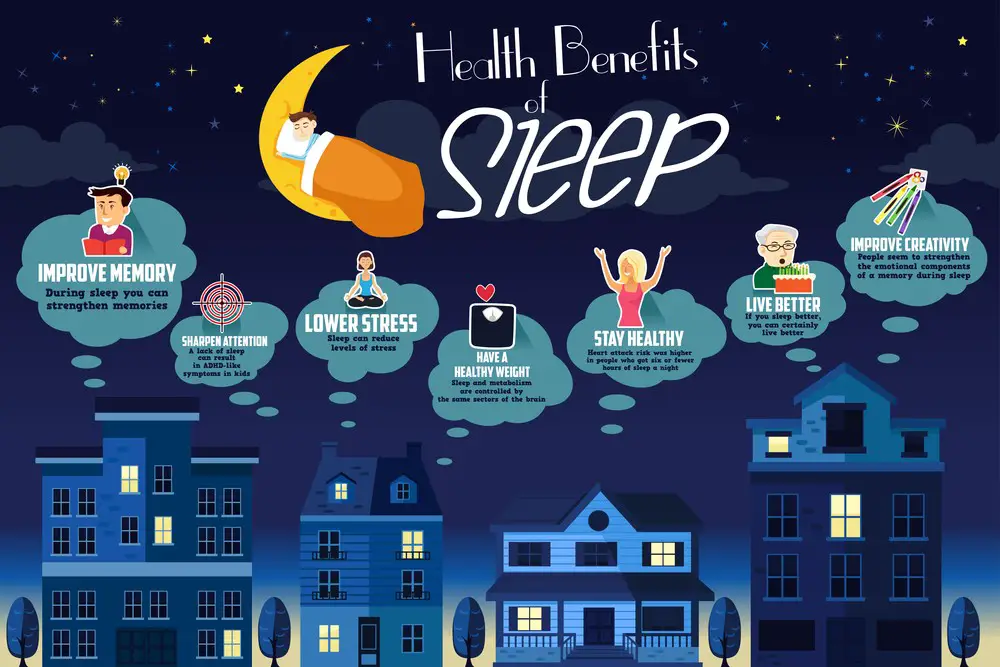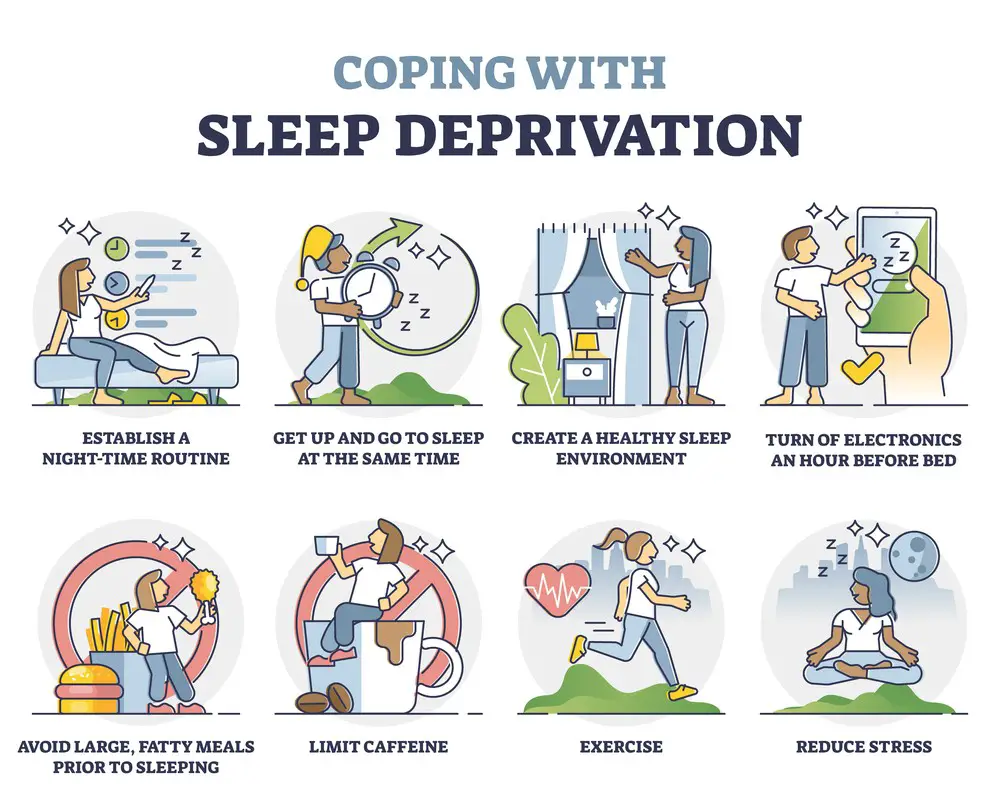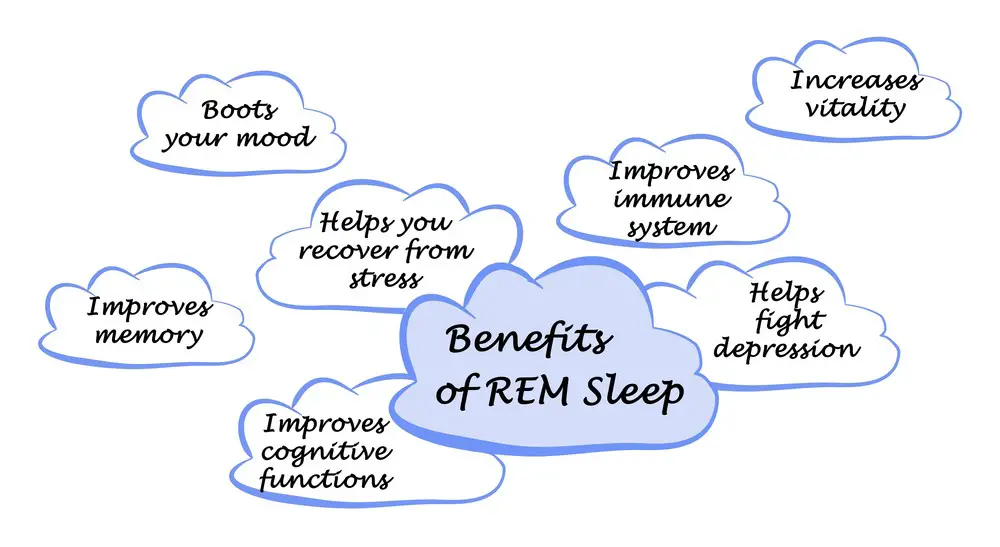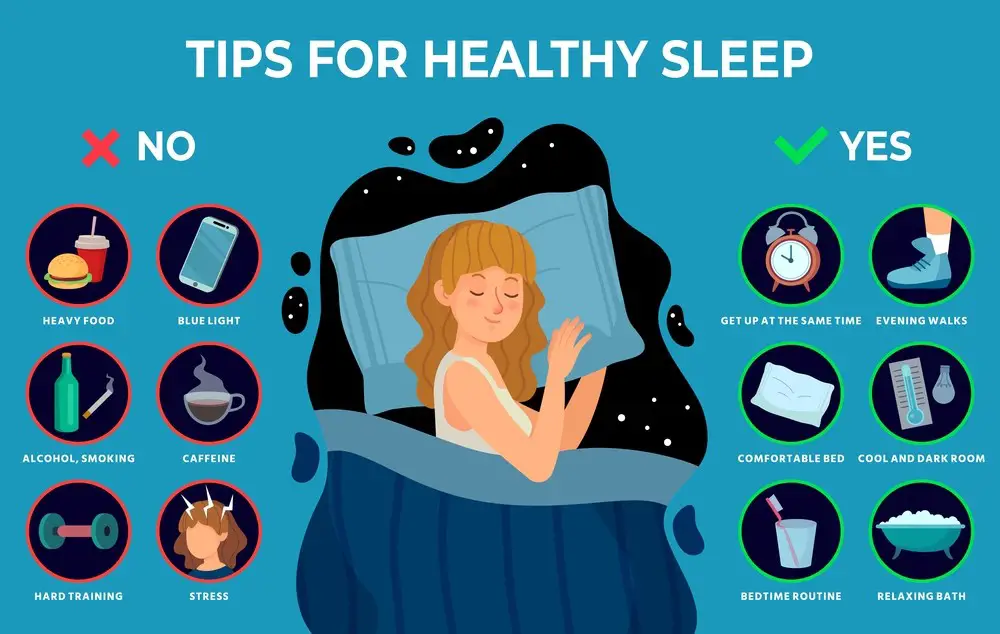As a BetterHelp affiliate, we receive compensation from BetterHelp if you purchase products or services through the links provided
Getting a good night’s sleep is essential for maintaining both physical and mental well-being. However, many people unknowingly commit “sleep sins,” which can interfere with the quality and duration of rest. These habits can negatively affect health, productivity, and emotional well-being, necessitating a better understanding of how to identify and avoid them.
Sleep is crucial in allowing our bodies to recover and rejuvenate, impacting everything from cognitive function to immune system strength. Awareness of common sleep sins is the first step to improving sleep hygiene and overall health. A greater emphasis on sleep health will help avoid the pitfalls of poor rest and pave the way for a more balanced and revitalized life.
Key Takeaways
- Recognizing and addressing sleep sins can significantly improve overall well-being.
- Achieving optimal sleep improves cognition, immune function, and emotional stability.
- Implementing strategies to overcome sleep sins can improve health and quality of life.
Understanding Sleep and Its Importance

Sleep is a vital part of our lives. It’s that necessary time when our body and mind recharge, allowing us to function well throughout our waking hours. While sleeping, your body undergoes several crucial processes like memory consolidation, muscle repair, and immune system strengthening.
Getting a good grasp on the importance of sleep is essential. That’s where understanding the circadian rhythm comes into play. The circadian rhythm is your body’s internal clock that regulates sleep patterns and helps maintain overall health. Your circadian rhythm naturally aligns with the day-night cycle, making it easier for you to fall asleep at night and stay awake during the day.
Having an inconsistent sleep pattern can be detrimental to your health. It’s essential to establish a regular sleep routine. Here are a few tips to foster healthy sleep habits:
- Establish a consistent sleep schedule: Aim to go to bed and wake up at the same time every day, even on weekends. This helps train your body to expect consistent sleep hours.
- Create a sleep-friendly environment: Make your sleeping space comfortable and conducive to rest. Maintain a cool and dark room with comfortable bedding and minimal noise.
- Watch what you consume before bedtime: Limit caffeine and late-night snacks, as they may disrupt your sleep pattern. Opt for a light, soothing snack or drink like warm milk or herbal tea instead.
Remember, adequate sleep keeps you alert, focused, and in good physical shape. Please don’t underestimate the power of a good night’s rest; it’s essential for your physical and mental well-being. Strive to maintain regular, healthy sleep patterns; your body and mind will thank you.
Common Sleep Sins and Their Effects

You may not realize it, but certain habits harm your sleep quality. Understanding these common sleep sins and their effects can improve your sleep hygiene and get a better night’s rest.
First and foremost, relying on caffeine to stay awake throughout the day is a double-edged sword. It may help you stay awake during the day, but it can also disrupt your natural sleep cycle. Too much caffeine, particularly late in the day, can lead to insomnia. Try to limit your intake and consider other strategies for staying alert, such as taking short breaks or going for a walk.
Another common sleep sin is overindulging in alcohol before bedtime. Though it may help you feel drowsy initially, alcohol disturbs the stability of your sleep, leading to more frequent awakenings and less restorative sleep. It’s better to moderate your alcohol intake and avoid drinking within three hours of bedtime.
Exposure to blue light from smartphones and other electronic devices is another habit that disrupts sleep. The blue light suppresses melatonin production, making it harder to fall asleep. Practice good sleep hygiene by turning off devices at least an hour before bed, or consider using blue-light-filtering apps to minimize the impact.
Sleep deprivation is more than just feeling tired. It can significantly impact your mood, memory, and cognitive function. Make getting enough sleep a priority and establish a consistent sleep schedule. Set a goal for how long you want to sleep and stick to that schedule, even on weekends.
Lastly, uncontrolled desires to stay up late can also lead to poor sleep quality. If you find yourself staying up late for no apparent reason, try setting boundaries for yourself and establishing a relaxing bedtime routine that signals to your body and mind that it’s time for rest.
Remember, improving your sleep is an ongoing journey. By being aware of these sleep sins and actively working to counteract them, you’re setting yourself up for better rest and overall well-being.
Key takeaway: Be mindful of caffeine and alcohol intake, limit blue light exposure, prioritize sleep, and establish a healthy bedtime routine to counteract common sleep sins.
Religious Perspective on Sleep Health

As a Christian, you may be interested in understanding sleep’s role in your spiritual life. Sleep health is essential to physical and spiritual well-being; the Bible has much to say about it.
Good sleep is crucial for mental and emotional health. When well-rested, your mind is sharp, and you can better discern God’s will for your life. Sometimes, the Holy Spirit may speak to you through dreams and visions when you sleep (Acts 2:17).
Conversely, the Bible also warns against the dangers of too much sleep. Proverbs 6:9-11 says that excessive sleep can lead to poverty and a lack of purpose. An unhealthy sleep pattern can also contribute to spiritual laziness, which may hinder your prayer life and make it challenging to stay connected to God.
Here are some tips to help maintain healthy sleep patterns from a Christian perspective:
- Pray before bed: Invite the Holy Spirit to guide your dreams and protect you from evil during sleep. This can help ward off nightmares and promote peace and relaxation.
- Set apart a time for rest: Prioritize and schedule regular times for rest, as it’s essential for renewal and rejuvenation (Genesis 2:2-3).
- Limit exposure to screens at night: Bright lights and stimulating content can interfere with your body’s sleep cycle. Consider reading the Bible or a spiritual book instead to prepare your mind for restful sleep.
- Practice forgiveness and grace: Holding onto grudges and unresolved problems can cause sleepless nights. Take the time to forgive yourself and others with God’s grace, creating a sense of peace that fosters good sleep (Ephesians 4:26-27).
Remember, by taking care of your physical sleep health, you also take care of your spiritual well-being. By nourishing your body and soul with rest, you can experience the fullness of God’s grace and power in your daily life.

Sleep Sins: 7 Common Nighttime Mistakes and How to Avoid Them
Everyone loves a good night’s sleep, but often we end up doing more harm than good when it comes to our bedtime routines. Let’s talk about the seven deadly “Sleep Sins” that might be disrupting your slumber.
1. The Late-Night Netflix Binge
Let’s be honest: We’ve all been guilty of this at some point. You tell yourself “just one more episode,” and before you know it, it’s 2 a.m.
How to Avoid:
- Limit your streaming time.
- Set an episode limit before you start watching.
2. The Midnight Snack Attack
You might think a little snack before bed is harmless, but certain foods can mess with your digestion and make it hard to get restful sleep.
How to Avoid:
- Opt for light, easy-to-digest foods.
- Drink herbal tea instead of snacking.
3. The Never-Ending Scroll
Your phone in bed? Bad idea. The blue light emitted can disturb your natural sleep cycle.
How to Avoid:
- Implement a digital curfew an hour before bedtime.
- Try reading a book instead.
4. The Inconsistent Sleep Schedule
Weekend warriors, listen up: Staying up late and sleeping in on weekends messes with your internal clock.
How to Avoid:
- Try to go to bed and wake up at the same time every day.
- Use a sleep tracker to monitor your habits.
5. The Overactive Mind
Worrying about the future or mulling over the past? That’s a fast track to a sleepless night.
How to Avoid:
- Write down your thoughts in a journal.
- Practice deep-breathing techniques.
6. The Caffeine Culprit
You love your late afternoon coffee, but it might be keeping you awake longer than you’d like.
How to Avoid:
- Switch to decaf after a certain hour.
- Know your body’s caffeine limits.
7. The Toss-and-Turn Tango
If you’re constantly adjusting your pillows and blankets, you’re not helping yourself get into a deep sleep.
How to Avoid:
- Invest in quality bedding.
- Stick to a pre-bedtime routine to signal your body it’s time to wind down.
Signs You Need Medical Help
Sleep issues can be more than just bad habits; they might signal a deeper issue like insomnia, sleep apnea, or restless leg syndrome.
- Chronic snoring
- Gasping for air while sleeping
- Difficulty falling or staying asleep for weeks
Goals and Monitoring Progress
Tracking your sleep habits can provide valuable insights:
- Aim for 7-9 hours of sleep per night.
- Keep a sleep journal.
- Use wearable tech to track your sleep stages.
Sleeping well is a journey. Start by avoiding these common sleep sins and take proactive steps to improve your nighttime routine. Sweet dreams!
Sleep Disorders Linked to Ill Health
Various sleep disorders can contribute to ill health, taking a serious toll on your mental and physical well-being. You may not even realize how sleep disturbances are impacting your daily life. Let’s explore some critical connections and takeaways to understand these issues better.
Unmanaged stress and anxiety can wreak havoc on your sleep, leading to various sleep disorders. This vicious cycle of stress and disrupted sleep can contribute to heart issues over time. Make sure you destress and relax before bedtime to keep your heart healthy.
One commonly overlooked symptom of sleep disorders is numbness. If you frequently wake up with numb limbs, it could be a sign that your sleep is being disrupted. This might seem inconsequential, but numbness may progress into more troublesome health concerns. So, don’t ignore it – talk to a healthcare professional to get to the root of the problem.
Experiencing frequent anger and irritability might indicate that your sleep patterns are out of whack. Unresolved sleep disorders can make you more prone to emotional disturbances, such as mood swings and short temper. Awareness of your emotional state is essential for addressing any underlying sleep problems.
Depression and sleep disorders often go hand-in-hand, with each exacerbating the effects of the other. To enhance your mental health, providing your body and mind with the rest they need is crucial. Experiment with relaxation techniques, like mindfulness or deep breathing exercises, to calm your mind before bedtime.
If you find yourself constantly feeling sick, it could indicate that your sleep is not doing its job in restoring your immune system. A weakened immune system leaves your body vulnerable to infections. Prioritize consistent, quality sleep to bolster your defenses against illness.
Key Takeaway: Recognize the signs of sleep disorders and their impact on your health. Tackle sleep issues by implementing relaxation techniques and seeking professional help when needed – it’s vital for maintaining your physical and mental well-being.
Emotional Consequences of Sleep Sins
Lack of sleep can indeed impact your emotional well-being. You may feel guilt, feel weak, and even harbor feelings of hate, bitterness, envy, or addiction. Let’s explore how sleep sins can cause these emotional consequences.
Guilt: When you skimp on sleep, you might feel guilty about various aspects of your life. Perhaps you didn’t perform your best at work or snapped at a loved one due to irritability. Remember, it’s important to prioritize your sleep to minimize these feelings of guilt and maintain a better emotional balance.
Weakness: Not getting enough sleep can make you feel emotionally weak and vulnerable. You may struggle to find the emotional bandwidth to handle day-to-day stressors. Pay close attention to your sleep hygiene and strive for a consistent routine to regain your emotional strength.
A few quick tips:
- Set a regular bedtime and stick to it.
- Create a calming pre-bed routine.
- Minimize blue light exposure before bedtime.
Hate, Bitterness, and Envy: Insufficient sleep often leads to increased irritability and a lower threshold for frustration. You may notice that misunderstandings or disputes seem to arise more often. These negative emotions can breed hate, bitterness, and envy toward others, straining relationships.
Addiction: Interestingly, people who regularly miss out on sleep are more susceptible to developing unhealthy habits or addictions. This is because the brain’s reward center becomes more active when you’re sleep-deprived, making you more likely to seek instant gratification through unhealthy means.
To combat these emotional consequences, focus on improving sleep quality and adopting healthier coping mechanisms. By taking charge of your sleep habits, you’ll be better equipped to maintain a positive emotional state.

Strategies to Overcome Sleep Sins
We all have desires that can lead to sleep sins, but don’t worry! With a little strength and discipline, you can rise above them. Let’s dive into some strategies to overcome those pesky sleep sins and get a better night’s rest.
First, try to create a calming bedtime routine. This can include:
- Reading a book
- Taking a warm bath
- Practicing mindfulness or meditation
By engaging in relaxing activities before bed, you’ll signal to your brain that it’s time to wind down, making it easier to drift off to sleep.
Another key strategy is sticking to a consistent sleep schedule. Try going to bed and waking up at the same time every day, even on weekends, to establish a healthy sleep pattern. Your body will thank you!
To avoid letting your desires overwhelm you during nighttime, find ways to address them earlier in the day. For example, if you tend to crave late-night snacks, try eating a small, healthy snack before your bedtime routine to curb your appetite.
Remember, your environment plays a significant role in your sleep quality. Keep your bedroom cool, quiet, and dark for the best sleep possible. Consider using blackout curtains, earplugs, or a white noise machine if needed.
Exercise can also work wonders for improving your sleep quality. Aim to get at least 30 minutes of physical activity every day. Just avoid exercising too close to bedtime, as it might be too stimulating for some people.
Finally, limit your exposure to screens and electronic devices before bed. The blue light emitted by screens can interfere with your body’s production of the sleep hormone melatonin, making it harder to fall asleep. Try setting an electronic curfew at least an hour before bedtime to give your brain a chance to unwind.
Incorporating these strategies into your daily routine will help you conquer sleep sins and enjoy a more restful, rejuvenating night’s sleep. Remember, it’s all about finding the right balance and having the discipline to prioritize your sleep health.
Conclusion
Having a good night’s sleep is crucial for your well-being and general health. By being mindful of the common sleep sins, you can take steps to improve both the quality and quantity of your sleep.
To recap, always maintain a regular sleep schedule even on weekends, keep your sleeping environment cozy and quiet, and avoid stimulants close to bedtime.
- It’s a great idea to adopt a bedtime routine that helps you unwind and relax, such as reading a book or taking a warm bath.
- Pay attention to your body’s signals and try not to force sleep if you aren’t tired.
- Employ relaxation techniques like deep breathing or guided imagery to help you drift off.
And remember, little changes can make a noticeable impact on your sleep health. By being conscious of your habits and creating a sleep-supportive environment, you’ll be well on your way to better rest.
Finally, don’t be afraid to seek professional help when necessary. Sometimes, sleep issues can be a sign of underlying health problems. Prioritize your sleep to live a happier, healthier life!
Stay rested and sweet dreams!
Frequently Asked Questions

Is sleep deprivation considered sinful?
Sleep deprivation in itself is not considered sinful, but it can lead to unfavorable scenarios where you might be more susceptible to committing sinful acts. When you are sleep-deprived, your decision-making is often impaired, and your capacity to resist temptation weakens. To keep yourself in good spiritual standing, it’s important to maintain a healthy sleep routine and ensure you’re getting adequate rest.
What is the connection between sleep and sin?
Sleep and sin are connected in that your sleep habits can influence your overall wellbeing, behavior, and spirituality. Poor sleep can result in a compromised ability to resist sinful urges, while quality sleep allows for emotional stability, increased focus, and better judgement. Cultivating healthy sleep habits will not only help you physically but also support your ongoing pursuit of virtuous living.
How can lack of sleep affect one’s spirituality?
Lack of sleep can negatively impact spirituality by causing irritability, poor decision-making, and a weakened resolve to avoid sinful desires. Your relationship with your spiritual principles and beliefs may suffer when you’re not well-rested. It’s essential to prioritize adequate sleep to maintain a strong spiritual connection and to uphold your moral values.
Does oversleeping have any moral implications?
Though not inherently immoral, oversleeping could lead to potential issues. Consistently oversleeping may create detrimental effects such as feeling sluggish, increased difficulty with focus, and reduced productivity. These consequences could make it harder to uphold your moral and spiritual commitments. Moderation is key, so strive for a balanced sleep schedule.
How can we improve our sleep while maintaining spiritual balance?
To achieve better sleep while maintaining spiritual balance, consider these tips:
- Create a calming bedtime routine, such as prayer or meditation to help relax your mind and body.
- Keep a consistent sleep schedule, even on weekends, by going to bed and waking up at the same times.
- Limit exposure to screens and electronics an hour before bedtime.
- Create a sleep-friendly environment by keeping the room cool and dark.
- Practice gratitude and focus on positive experiences from your day.
- Set aside time for daily prayer, reflection, or spiritual growth to maintain your spiritual balance.
Can sleep habits impact virtuous living?
Yes, sleep habits can impact virtuous living. When you have a healthy sleep routine and allow yourself the rest you need, your capacity to engage with virtuous behaviors and uphold your moral principles is significantly enhanced. By focusing on quality sleep, you’re better equipped to navigate through life with wisdom, patience, and compassion.
- Breaking the Silence: Why Men’s Mental Health Matters More Than Ever - April 15, 2025
- How to Transform a Home’s Patio Space into a Relaxing Space - March 23, 2025
- 5 Strategies to Use a Cell Phone to Help Manage Your Stress - March 23, 2025
This site contains affiliate links to products. We will receive a commission for purchases made through these links.



